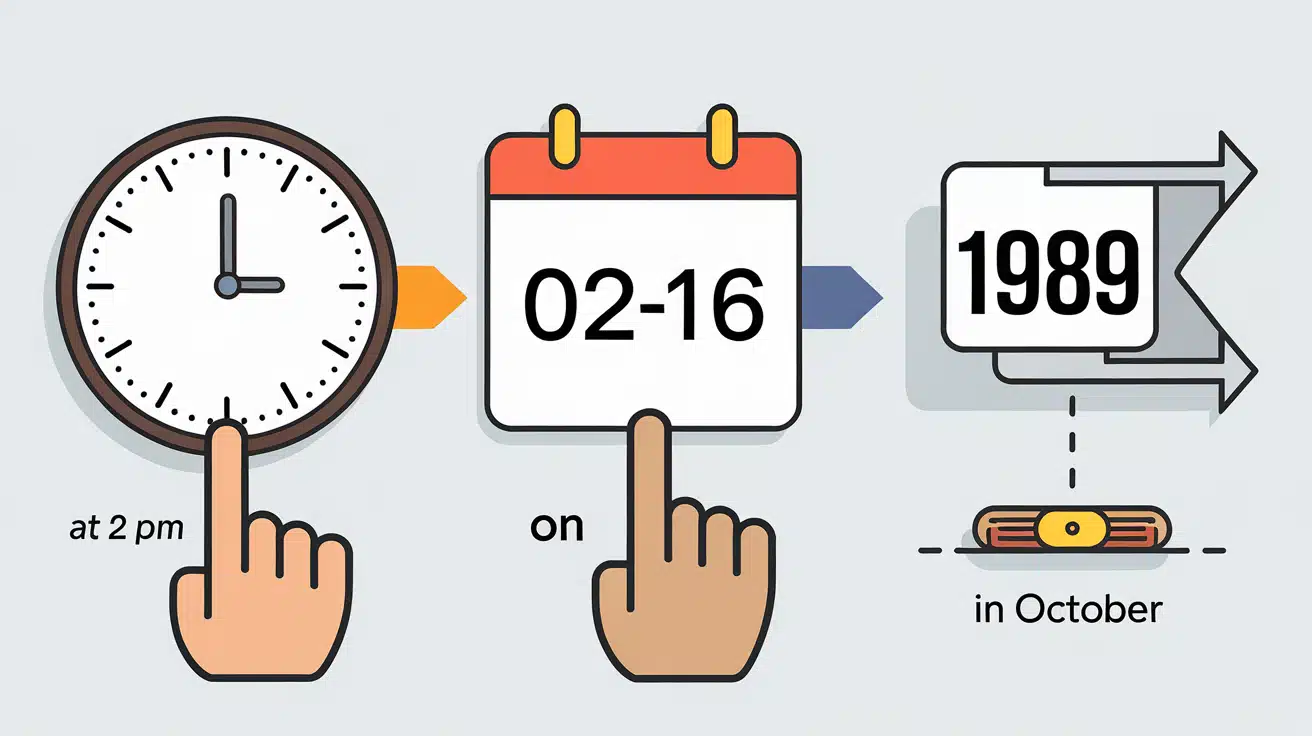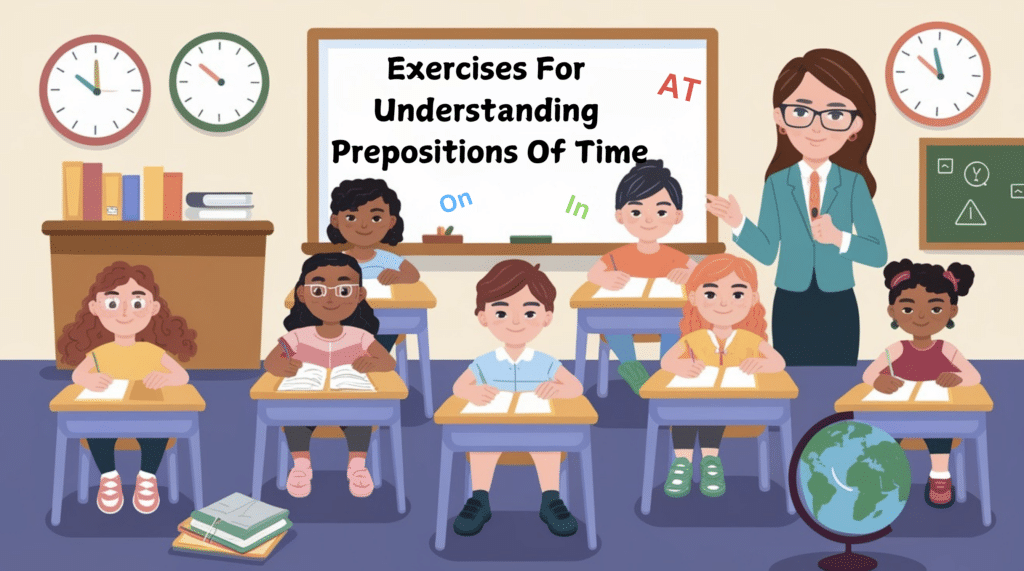Time mix-ups can ruin your day.
Have you ever missed a meeting because someone said “in Monday” instead of “on Monday”? Or show up an hour late because you confused “at noon” with “in noon”?
Many English speakers are confused by small words about time. Prepositions of time (at, on, in) are tiny but crucial words that tell us exactly when things happen.
Without them, we’d struggle to set up meetings, plan events, or even tell someone when we’d meet for coffee.
You’re not alone if you find these words tricky.
But here’s the good news: with the right exercises and practice methods, you can master these prepositions quickly.
This guide will walk you through simple, practical exercises that will help you use prepositions of time correctly in your everyday conversations.
What Are Prepositions Of Time?
Prepositions of time tell us when something happens, occurred, or will take place. These small but important words help us discuss moments, dates, periods, and durations in our daily communications.
Let’s look at the three main prepositions of time and how to use them:
1. At
We use “at” for specific times of day:
- She arrives at 9 AM each morning
- The store closes at midnight
- We eat dinner at 6 PM
2. On
We use “on” for specific days and dates:
- The meeting is on Monday
- My birthday falls on March 15th
- The concert happens on New Year’s Eve
3. In
We use “in” for longer time periods:
- The flowers bloom in spring
- I was born in 1995
- They go skiing in December
These prepositions often work together in sentences to provide precise timing information.
When someone says, “I’ll see you at noon on Saturday in July,” they’re using all three prepositions to communicate exactly when the meeting will occur.
Similarly, saying, “The museum opens at 10 AM on weekdays in summer,” gives a complete picture of the timing. Teachers might tell students, “Classes start at 8 AM on Mondays in September,” to ensure everyone knows the exact schedule.
By using these prepositions correctly, we can specify time with clarity and precision in our everyday communication.
Common Errors With Prepositions Of Time And How To Fix Them

1. Mixing Up “On” And “In” For Dates And Months
- Mistake: Saying “in July 15th” instead of “on July 15th.”
- Rule:
- Use “on” for specific dates: “The party is on December 25th.”
- Use “in” for months alone: “The party is in December.”
2. Misusing “At” For Specific Times And Events
- Mistake: Saying “in 3 o’clock” or “on 3 o’clock” instead of “at 3 o’clock.”
- Rule:
- Use “at” for specific times: “at 3 o’clock.”
- Use “at” for fixed phrases like “at night” or “at noon.”
- Use “in” for general periods: “in the morning.”
3. Adding Unnecessary Prepositions
- Mistake: Saying “at around 7 PM” or “on this year.”
- Rule:
- Choose one: “at 7 PM” or “around 7 PM.”
- Say “this year” instead of “on this year.”
Understanding Prepositions Of Time Through Exercises
A. Fill-In-The-Blank Sentences
Fill in the blanks with the correct preposition of time: at, on, in, by, or during.
- I usually wake up ___ 7 AM every morning.
- They got married ___ December, two years ago.
- We will go hiking ___ Sunday if the weather is good.
- The train will arrive ___ 10 minutes.
- My grandfather was born ___ the 1940s.
- Let’s have a party ___ Christmas Eve.
- I prefer studying ___ in the evening when it’s quiet.
- The deadline is ___ at the end of the day.
- We’ll visit them ___ the weekend.
- He always takes a nap ___ the afternoon.
Answers
- at
- in
- on
- in
- in
- on
- in
- by
- on
- in
B. Match The Prepositions
Match the prepositions in Column A with the correct time-related phrases in Column B.
| Column A (Prepositions) | Column B (Time-Related Phrases) |
|---|---|
| at | midnight |
| on | my birthday |
| in | March |
| during | the summer holidays |
| by | the end of the week |
| on | a specific date |
| in | the 1990s |
| at | 5 PM |
Answers
- at – midnight, 5 PM
- on – my birthday, a specific date
- in – March, the 1990s
- during – the summer holidays
- by – the end of the week
C. Correct The Sentence
Correct the prepositions in these sentences and rewrite them properly.
- I’ll meet you on 3 PM.
- He was born at 1987.
- Let’s visit grandma in Monday.
- They go skiing during July.
- The store closes by the night.
- We finished our homework at the morning.
- The event is scheduled in 5 PM.
- She will arrive by Saturday morning.
Answers
- I’ll meet you at 3 PM.
- He was born in 1987.
- Let’s visit Grandma on Monday.
- They go skiing in July.
- The store closes at night.
- We finished our homework in the morning.
- The event is scheduled at 5 PM.
- She will arrive on Saturday morning.
D. Create Your Own Sentences
Write sentences using the following prepositions of time:
- On: Write about an event happening on a specific day.
- At: Mention a particular time for an activity.
- In: Describe a month, year, or part of the day.
- By: Indicate a deadline or specific time limit.
- During: Mention something that happens within a time frame.
Example Answers
- On: “I will visit my grandparents on Saturday.”
- At: “Dinner is served at 8 PM.”
- In: “I was born in April.”
- By: “We need to finish the project by Friday.”
- During: “It rained heavily during the night.”
E. Timeline Challenge
Match the given events with the appropriate prepositions of time based on a timeline.
Timeline of Events:
- Breakfast at 8:00 AM
- Meeting on Monday
- Trip in August
- Deadline by next Friday
- Concert during the evening
Task: Write the correct preposition for each event in the blank provided:
- The trip is scheduled ___ August.
- We need to submit the report ___ next Friday.
- Let’s have breakfast ___ 8:00 AM.
- The meeting is happening ___ Monday.
- The concert will take place ___ the evening.
Answers:
- in
- by
- at
- on
- during
F. Create A Dialogue
This expanded dialogue provides a longer and more realistic conversation for readers to fill in missing prepositions of time.
Dialogue:
Anna: Hey, want to grab lunch ___ Saturday?
Ben: Sure! How about ___ 12:30 PM?
Anna: Perfect. Oh, by the way, there’s a flea market happening ___ the weekend. Want to check it out?
Ben: Sounds fun! Do you know if it’s open ___ the afternoon?
Anna: Yes, I read it’s open from 10 AM ___ 4 PM.
Ben: Great. Also, don’t forget about the project due ___ the end of the week.
Anna: I know! I plan to finish it ___ Thursday evening.
Task: Fill in the blanks with at, on, in, by, during, etc.
Bonus Task: Rewrite the conversation using different time frames (e.g., instead of “lunch on Saturday,” make it “dinner on Friday”) and adjust the prepositions accordingly.
Answers:
- on
- at
- during
- in
- to
- by
- on
Everyday Tips For Using Prepositions Of Time Correctly
Using prepositions of time correctly gets easier with daily practice.
When making appointments or plans, focus on proper usage, such as “The meeting is at 2 PM on Tuesday in October.” This hands-on practice builds good habits naturally.
Simple memory tricks help, too. Think of “at” as a clock’s point, “on” as placing something on a calendar date, and “in” as putting events inside longer time periods.
These mental pictures make choosing the right preposition quick and easy.
Listen carefully to how native speakers use time prepositions in their regular talk. Notice their patterns and copy them in your own speech.
With steady practice in real situations, you’ll use these prepositions correctly without even thinking about it.
Conclusion
Mastering prepositions of time takes practice, but it’s a fundamental skill for clear communication in English.
These small words – at, on, and in – play a vital role in how we talk about schedules, events, and timing in our daily lives.
When you understand the basic rules and common mistakes, you can express time-related information with confidence and accuracy.
Remember that specific times need “at,” particular dates use “on,” and longer periods take “in.”
Keep these patterns in mind as you practice in real-world situations.
By paying attention to how you use these prepositions and learning from others, you’ll steadily improve your ability to communicate clearly about time in English.


















